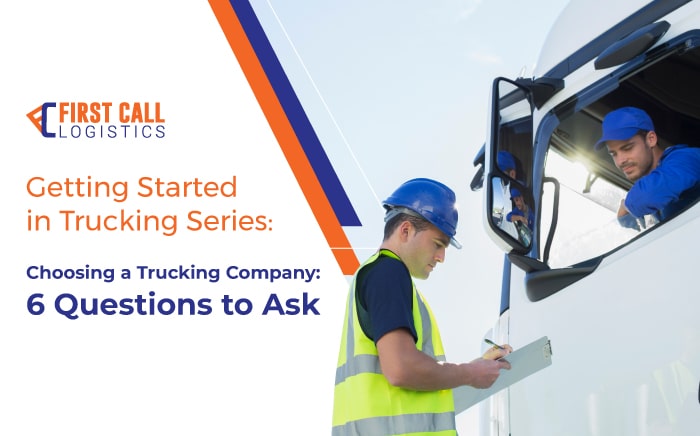Choosing a Trucking Company: 6 Questions to Ask

As a vital piece of the American economy, good truck drivers are consistently in demand throughout the country. That makes now a great time for truckers to explore which hiring businesses are offering the best mix of culture and compensation.
Future success in the trucking industry is largely contingent on the company you choose to work for, and there are several factors to consider before settling on the right place for you. A company’s size, track record, and ability to provide its fleet of drivers with consistent jobs all play an important role in creating an ideal work environment. Here are the most important questions you’ll want to ask when evaluating trucking companies:
1. How Well Does a Company Treat Its Employees?
This one is at the top for obvious reasons. It’s easy for a recruiter to promise frequent work and eye-catching benefits over the phone and another altogether to consistently deliver on those promises. Seek out trucking companies with an established track record of dealing fairly with drivers and honoring work contracts. Reviews from current or former employees are a good way to gauge what it’s like working for a specific company.
2. Will the Company Support You with Quality Equipment?
Good equipment is a big part of how a company takes care of its drivers. When you’re on the road, the truck acts as your second home — so be sure it’s a place you’re comfortable spending hours at a time in before you sign anything. Most companies will allow an inspection of the truck if you express a legitimate interest in joining their ranks. Remember to gather any relevant details behind the truck’s safety features during your overview, particularly in older vehicles that may not be outfitted with the latest tech.
3. Does the Trucking Company Offer the Jobs You Want?
Not all trucking jobs are made for every driver. Key factors like run and range can vary wildly, from local in-state jobs to routes spanning the entire country. Some lifestyles are better equipped to handle over-the-road style work, while others would prefer to see home more of the time. Everything from the routes you hope to run to the type of freight you’re trained to take on changes how you might see different companies. If your goal is to drive a flatbed or tanker, you’ll need to explore whether a company frequently offers or specializes in that type of job.
4. Is the Company Offering Competitive Pay, Benefits, and Tuition Reimbursement?
For truck drivers in a high-demand business, it’s always worth comparing rates to ensure your total compensation — including salary, raises, bonuses, and overtime rates — remains competitive with industry standards. Remember some compensation packages include benefits like improved insurance and retirement plans when comparing salary offers.
As an entry-level driver, you might also consider the additional perks of tuition reimbursement for corporate-sponsored driving schools. Training can be an expensive undertaking, but some schools will offer discounts or repayment plans or even cover your training in full in exchange for a signed contract with the sponsoring company.
5. How Much Does the Company Invest in Safety?
A good trucking company will endeavor to keep both drivers and civilians safe. Though the FMCSA regulates a baseline set of standards for industry safety, it’s far better to work with a company that goes beyond the bare minimum. When it comes to easily-overlooked details like company vehicle maintenance and workplace policies, employers who invest in a culture of safety and responsibility inevitably become the preferred places to work within the industry.
6. What Types of Training and Development Will the Company Provide?
Every new driver should consider where best to find opportunities for career growth. Earning endorsements to carry specialized freight is a good way to make yourself more valuable within the ranks of a company, but some companies don’t offer the training needed to expand your skillset. A good employer will provide consistent experience behind the wheel while helping you develop abilities to increase your earning potential.
Learn More About Carrier Opportunities with First Call Logistics
At First Call, we’re committed to supporting our carrier network with the resources necessary to be successful. To learn more about First Call’s dedicated and transactional freight opportunities, flexible payment options, and 24/7 carrier support, contact us today.
The 3PL You’ve Been Looking For
Building and managing cost-efficient supply chains is a full-time job. First Call’s rare combination of in-house assets, expert problem-solving and track record of stellar customer service makes us the 3PL of choice for carrier partners looking to make the most of their miles.
“First Call always paid on time and would get me back-hauls whenever possible which was great.”
– Wayne, Carrier
More Resources for FCL Carriers:
- Article: Is a Trucking Career Right for Me?
- Article: Careers in Truck Driving: Choosing the Right Job
- Article: A Look at 9 Kinds of Trucking Jobs
- Article: Reviewing Your CDL Training Options
- Article: How to Earn a CDL and Trucking Endorsements
- Article: Advantages of Driving for Private, For-Hire & Independent Trucking Companies
Get the latest supply chain news and updates directly to your inbox.